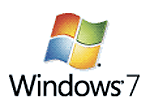More on Windows 7 and Netbooks
By Harry McCracken | Friday, May 22, 2009 at 12:29 pm
 Microsoft is still wrestling with the question of how to get Windows 7 onto dirt-cheap netbooks without crushing the profit margin it makes when it sells copies of Windows to PC manufacturers. Two pieces of scuttlebutt emerged today; one sounds promising for netbook buyers, and the other is kind of discouraging.
Microsoft is still wrestling with the question of how to get Windows 7 onto dirt-cheap netbooks without crushing the profit margin it makes when it sells copies of Windows to PC manufacturers. Two pieces of scuttlebutt emerged today; one sounds promising for netbook buyers, and the other is kind of discouraging.
Promising scuttlebutt: Paul Thurrott is reporting—very briefly–that Microsoft has decided to lift the three-applications-at-a-time restriction from Windows 7 Starter Edition, the version of the OS that it expects to be popular on netbooks. While there were numerous exceptions to the limit, it’ll still be good news if it’s gone–as long as Microsoft doesn’t compensate by hobbling Starter Edition in some other way.
Discouraging scuttlebutt: A site called Tech ARM has what it says is a list of limitations that Microsoft will apply to machines that qualify to come with Windows 7 Starter Edition preinstalled. They’re tighter in some places than the similar restrictions for Windows XP, and laxer in others–but the one that sticks in my craw is the continuing requirement that netbooks ship with a maximum of 1GB of RAM. RAM’s cheap enough these days that there would surely be 2GB netbooks if Microsoft didn’t try to prevent them from shipping. And I know from my experience with my own Asus EeePC 1000HE that it’s a markedly more pleasing computer with the 2GB upgrade that I installed than it would have been with half the RAM.
There’s something basically unsettling about a software provider putting rules in place to discourage PC manufacturers from selling well-equipped PCs–especially when said software provider has a big ad campaign going that’s centered around specsmanship. I hope that the rumors are wrong–or if they’re right, that Microsoft takes yet another pass at figuring out how to put Windows on netbooks in a way that makes sense.
6 Comments
Read more:
3 Comments For This Post
3 Trackbacks For This Post
-
Maybe They Should Call It “Windows 7 Grudging Acknowledgement of Reality Edition” | Technologizer Says:
May 30th, 2009 at 9:07 am[…] all: News Paul Thurrott had it right: Microsoft has decided to lift the three-apps-at-a-time limitation from Windows 7 Starter Edition, […]
-
Toshiba (Finally) Does Netbooks | Technologizer Says:
June 1st, 2009 at 12:01 pm[…] gives me pause with all netbooks: The NB205 comes with 1GB of RAM. I persist in being frustrated by Microsoft licensing terms that make it impossible to sell a low-cost netbook with 2GB of RAM and a …. It seems especially silly to hobble machines as appealing and attractive as these Toshibas with an […]
-
Resolved: There Are No Such Things as Netbooks | Technologizer Says:
June 23rd, 2009 at 11:50 am[…] have basic CPUs and graphics that aren’t well-suited to high-end tasks; thanks in part to Microsoft licensing rules, they have skimpy amounts of RAM. But that doesn’t make them something other than notebooks. […]













May 23rd, 2009 at 4:13 am
Since computers reached a certain speed, I stopped worrying about processor and memory.
Here’s a perfectly fine $250 netbook specification:
– Display: 10 inches
– Battery: 8 hours
– Storage: 8 GB SSD
– Weight: 1 kg
– Processor: 800MHz
– Memory: 512MB
As you can see, comfort and portability are the most important factors.
I’d be more than happy with a 800MHz/512MB netbook as long as it had decent display and keyboard sizes. All I need is a browser, really.
Thus, a Linux/ARM netbook would fit the bill.
May 23rd, 2009 at 9:49 am
Foo: Yeah that’s fine until you want to compress that 40mb video you took on your phone so it fits on Facebook.
No one should be fooled that a Netbook of that spec will not let you down at some point. They’re fine as an extra machine for taking out and about, or sitting on the sofa – but not as a main PC. Pay a bit more, and you could get one that could be used for both (asides from the small screen)
May 23rd, 2009 at 1:40 pm
@Harry: “… the one (restriction) that sticks in my craw is the continuing requirement that netbooks ship with a maximum of 1GB of RAM. RAM’s cheap enough these days that there would surely be 2GB netbooks if Microsoft didn’t try to prevent them from shipping.”
Microsoft’s doing no such thing. They are simply saying if it’s not an el-cheapo netbook it would be better off with a more comprehensive edition of Windows on it. Will MS make more money on the “Home” rather than “Starter” edition? Yup. And the netbook manufacturers and retailers will make more money on what is, technically, no longer a netbook (unless they’re all willing to give away the better hardware for free).